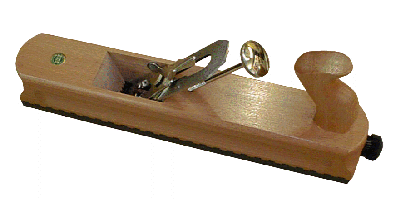There really wasn't anything to do to the
plane to get it ready to work, even the blade was sharp! Aside from cleaning the blade,
the plane was basically ready to use right out of the box. I was curious to see how this
wooden plane would compare to the machined metal planes I own in regards to the flatness
of the sole. What I discovered was that the Emmerich is every bit as flat and square as my
machined cast-iron Veritas smoother plane.
If I'm going to do much hand planning, I'll usually make a couple of swipes with a
paraffin block on the sole to make the task a little easier. I've found that this is
totally unnecessary with the 741-P. It requires noticeably less effort to push, no doubt
due to the natural oils contained in the Lignum Vitae sole.
Ergonomics
There is a smallish (tote) handle in the back and none up front. Actually the whole front
is the handle - it just looks a little different compared to other planes. I have found
the handle in the back to be a little on the short side. I think I'll alleviate that
feeling after I sand the top horn down a little. I've found that I really like the front
grip. In use, I found the 741-P to be very controllable and adjustable; I think the length
and grip has a lot to do with this controlled feel.
The plane uses a simple but effective anti-backlash adjustment mechanism. At a glance the
mechanics look like other planes but in fact, the blade along with its cap and lateral
adjustment are held in position by a long rod that is tensioned by a stout spring. Some
gross adjustments are performed by a knob in the rear which varies the tension on the rod.
However, most adjustments are made using the long stemmed knob behind the blade. What this
means to a user is when the blade needs to be lowered or raised, it doesn't have a
"dead" spot on the knob where there is no blade movement. This makes it very
easy to make small adjustments with out a lot of tedious back and forth adjustments
required of other planes.
Comparison
I compared the 741-P to several of my iron planes,
just to get a feel for the differences. Basically what I've come to believe is that in
simple planning action, the 741-P performs more or less as good as my Veritas planes.
Where one slightly edges out another in one aspect, it is regained in another. The blade
is bedded at a steeper angle than most planes. I believe this keeps the chips flowing more
freely, this can be a bit of a nuisance on some of my other planes. It is in the areas of
ergonomics and adjustment that the differences become clear. In regard to adjustment, the
Emmerich is a clear winner. In overall feel of heft, control, and action, I prefer the
Emmerich, it would probably be perfect if it had a larger tote handle.
Summary
The Emmerich 741-P is a very good plane among several good planes to choose from. Compared
to other planes I've used, it offers far better depth adjustment and a hard to describe
"live" feel to it. Emmerich makes a multitude of different types of planes, the
model 741-P is basically deigned for general purpose flattening of boards. It is somewhere
in between a true jointer plane and a smoother, basically (as I've found), it's a very
good general purpose plane.
Other reviews of ECE planes are the 711 Smooth and 710-P Rabbet planes |
